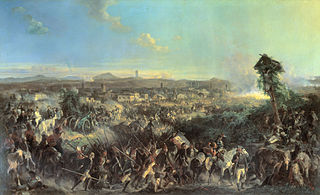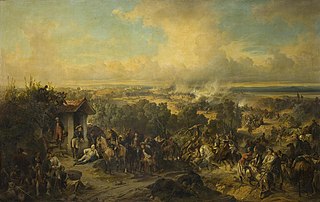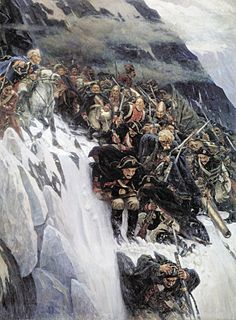
The Battle of Novi saw a combined army of Habsburg Austrians and Imperial Russians under Field Marshal Alexander Suvorov attack a Republican French army under General Barthélemy Catherine Joubert. After a prolonged and bloody struggle, the Austro-Russians broke through the French defenses and drove their enemies into a disorderly retreat. Joubert was killed while French division commanders Catherine-Dominique de Pérignon and Emmanuel Grouchy were captured. Novi Ligure is in the province of Piedmont in Italy a distance of 58 kilometres (36 mi) north of Genoa. The battle occurred during the War of the Second Coalition which was part of the French Revolutionary Wars.

The Battle of Trebbia or the Napoleonic Battle of the Trebbia was fought near the Trebbia River in northern Italy between the joint Russian and Habsburg Austrian army under Alexander Suvorov and the Republican French army of Jacques MacDonald. Though the opposing armies were approximately equal in numbers, the Austro-Russians severely defeated the French, sustaining about 6,000 casualties while inflicting losses of 12,000 to 16,500 on their enemies. The War of the Second Coalition engagement occurred west of Piacenza, a city located 70 kilometres (43 mi) southeast of Milan.

Alexander Vasilyevich Suvorov was a Russian military leader, considered a national hero. He was the Count of Rymnik, Count of the Holy Roman Empire, Prince of Italy, and the last Generalissimo of the Russian Empire.

The War of the Second Coalition (1798–1802) was the second war on revolutionary France by the European monarchies, led by Britain, Austria and Russia, and including the Ottoman Empire, Portugal, Naples, various German monarchies and Sweden. Their goal was to contain the expansion of the French Republic and to restore the monarchy in France. They failed to overthrow the revolutionary regime and French territorial gains since 1793 were confirmed. In the Treaty of Lunéville in 1801, France held all of its previous gains and obtained new lands in Tuscany, Italy, while Austria was granted Venetia and the Dalmatian coast. Britain and France signed the Treaty of Amiens in March 1802, bringing an interval of peace in Europe that lasted for 14 months. By May 1803 Britain and France were again at war and in 1805 Britain assembled the Third Coalition to resume the war against France.
By 1799, the French Revolutionary Wars had resumed after a period of relative peace in 1798. The Second Coalition had organized against France, with Great Britain allying with Russia, Austria, the Ottoman Empire, and several of the German and Italian states. While Napoleon's army was still embroiled in Egypt, the allies prepared campaigns in Italy, Switzerland, and the Netherlands.

The Italian campaigns of the French Revolutionary Wars (1792–1802) were a series of conflicts fought principally in Northern Italy between the French Revolutionary Army and a Coalition of Austria, Russia, Piedmont-Sardinia, and a number of other Italian states.

Suvorov Memorial Museum in Saint Petersburg, Russia is a military museum dedicated to the memory of Generalissimo Alexander Suvorov (1729-1800). It was founded in 1900 to commemorate the century of Suvorov's death and was inaugurated four years later, on the 175th anniversary of Suvorov's birth, with much pageantry, in the presence of Emperor Nicholas II.

Alexander Mikhailovich Rimsky-Korsakov was a Russian general remembered as an unlucky assistant to Alexander Suvorov during his Swiss expedition of 1799–1800.

The Italian and Swiss expeditions of 1799 and 1800 were undertaken by a combined Austro-Russian army under overall command of the Russian General Alexander Suvorov against French forces in Piedmont, Lombardy and Switzerland as part of the Italian campaigns of the French Revolutionary Wars in general and the War of the Second Coalition in particular.

The Hausstock is a mountain in the Glarus Alps, at an elevation of 3,158 m (10,361 ft) on the border between the cantons of Glarus and Graubünden. It overlooks the valleys of Linth and Sernf rivers in Glarus, and the valley of the Vorderrhein river in Graubünden. The Hausstock was the site of the 1799 withdrawal of the Russian army under General Alexander Suvorov. A well-known destination already in the nineteenth century with British and American climbers, the mountain remains popular with mountain climbers and skiers.

Arkadi Alexandrovich Suvorov, Count Rymniksky, was a Russian general. A son of Alexander Suvorov, he rose to the rank of lieutenant general.

Battle of Kozludzha fought on 20 June 1774 near the village of Kozludzha was one of the final and decisive battles of the Russo-Turkish War (1768–74). The Russians managed to rout the Ottoman army, scoring a major victory. This battle, alongside several others in this campaign, established the reputation of the Russian general Alexander Suvorov as a brilliant commander of his era.
The Battle of Bassignana saw an Imperial Russian corps led by Andrei Grigorevich Rosenberg attempt to establish a bridgehead on the south bank of the Po River in the presence of a Republican French army under Jean Victor Marie Moreau. The French rapidly massed superior strength and attacked. After several hours of hard fighting, the Russians abandoned their foothold with serious losses. This War of the Second Coalition action occurred near the town of Bassignana, located in the angle between the Po and Tanaro Rivers, about 19 kilometres (12 mi) northeast of Alessandria, Italy.

Diederich Arend von Rosenberg or Andrei Grigoryevich Rosenberg (1739–1813) was an Imperial Russian general who led troops against Ottoman Turkey, the Polish–Lithuanian Commonwealth and Republican France. During the War of the Second Coalition he capably led an army corps under the famous Alexander Suvorov at Cassano, Bassignana and the Trebbia. While in independent command, he badly defeated a French force under Edouard Mortier in the Battle of Muotathal on 1 October 1799.

Andrei Ivanovich Gorchakov led a Russian infantry corps in the German Campaign of 1813 and the French Campaign of 1814 during the Napoleonic Wars. He participated in the 1799 Italian and Swiss expedition on the staff of his uncle Alexander Suvorov and was at Cassano, the Trebbia and Novi. In 1812 he fought at Smolensk and Borodino. At Bautzen in May 1813 he led the second line of the Right Wing. He commanded the 1st Infantry Corps, at Dresden and Leipzig in 1813 and at Bar-sur-Aube, Laubressel and Paris in 1814.

The First Battle of Marengo or Battle of San Giuliano saw Republican French soldiers under General of Division Jean Victor Marie Moreau launch a reconnaissance in force against a larger force of Habsburg Austrian and Imperial Russian troops led by Field Marshal Alexander Suvorov. The French enjoyed initial success, pressing back their opponents. However, large Austrian and Russian reinforcements soon arrived, causing the French to withdraw into Alessandria. This War of the Second Coalition action occurred near the town of Spinetta Marengo, located just east of Alessandria in northwest Italy.
The Second Battle of Marengo or Battle of Cascina Grossa saw Republican French troops under General of Division Jean Victor Marie Moreau clash with a force of Habsburg Austrian soldiers led by Feldmarschall-Leutnant Heinrich von Bellegarde. The early fighting between Emmanuel Grouchy's division and Bellegarde was inconclusive. However, late in the day Moreau committed Paul Grenier's French division to the struggle and the Austrians were driven from the field. This War of the Second Coalition battle occurred near Spinetta Marengo which is just east of Alessandria, Italy.

The Battle of Linth River saw a Republican French division under General of Division Jean-de-Dieu Soult face a force of Habsburg Austrian, Imperial Russian, and Swiss soldiers led by Feldmarschall-Leutnant Friedrich Freiherr von Hotze in Switzerland. Soult carefully planned and his troops carried out a successful assault crossing of the Linth River between Lake Zurich and the Walensee. Hotze's death early in the action disorganized the Allied defenders who were defeated and forced to retreat, abandoning supplies accumulated for Field Marshal Alexander Suvorov's approaching army. On the same day, General of Division André Masséna's French Army of Helvetia defeated Lieutenant General Alexander Korsakov's Russian army in the Second Battle of Zurich and a French brigade turned back another Austrian force near Mollis. Both Korsakov's Russians and Hotze's survivors, led by Feldmarschall-Leutnant Franz Petrasch withdrew north of the Rhine River.

The Kinzig Pass or Chinzig Pass or Chinzig Chulm is a high mountain pass in the Schwyz Alps of Central Switzerland. The trail across the pass reaches a maximum elevation of 2,073 metres (6,801 ft). During the War of the Second Coalition, the Allied army of Alexander Suvorov marched across the pass.

Wilhelm Christoforovich Derfelden was a Imperial Russian General of the Cavalry from a family of Baltic Germans. He fought in the Russo-Turkish War of 1768–1774, Russo-Turkish War of 1787–1792, Polish–Russian War of 1792, and Kościuszko Uprising of 1794. In the latter conflict he led troops in the battles of Chełm and Praga. After a period of unemployment, he joined Alexander Suvorov's army in 1799 as a military mentor to Grand Duke Konstantin Pavlovich of Russia. He subsequently led a corps at Novi, Gotthard Pass, and in Suvorov's Switzerland campaign.
















